These Powerful Photos Show What OCD Really Feels Like

By:
Life with mental illness can be difficult to comprehend if you haven't experienced it firsthand. To help bring understanding to mental health, in particular Obsessive Compulsive Disorder, photographer Dan Fenstermacher created the portrait series "Overcoming Challenges Daily." His photos let viewers see what having OCD is really like and push back against the ways it is often stigmatized and stereotyped in pop culture.
Fenstermacher wanted to showcase the diverse ways that OCD impacts people's lives, spread awareness of the disorder, and make others suffering from it feel less alone. "I've had a lifelong experience with OCD ranging from skin picking, anxiety, depression, lock checking, and repetitive hand gestures and motor tics," the artist told ATTN:.“I hope that by sharing my story others will be able to find helpful resources and tips for themselves or a loved one."
Here are five of Fenstermacher's portraits of people living with OCD and their statements about their experiences.
1. Mary Samson
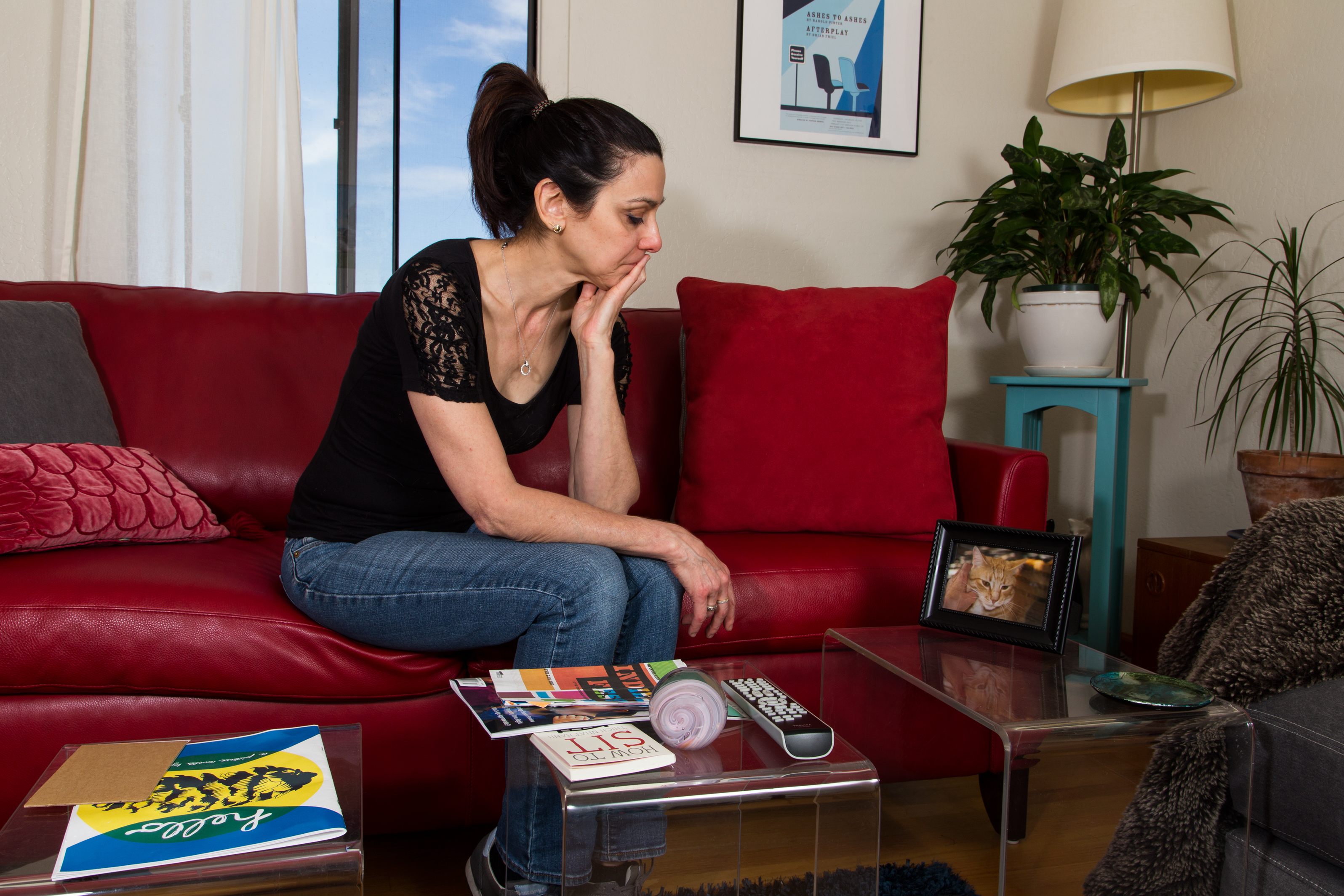 "Is He Okay?"/Dan Fenstermacher
"Is He Okay?"/Dan Fenstermacher
"My cat’s name is Mish-Mish. One of my ever-present OCD fears is that something will happen to him. I don’t have children. I suppose he is like my child and looms large. OCD is a disease of uncertainty and doubt. And you can’t be sure of much when it comes to a cat. They are quite independent. Most of my OCD is image based. I imagine something bad happening to him; so much is out of my control. Although I worry about him, most of the time he comforts me and calms me down. I’m better able to cope with the fears and worries about my cat if I use my ERP (Exposure Response Prevention) and ACT (Acceptance Commitment Therapy) tools. It’s an ongoing process."
2. Ethan Smith
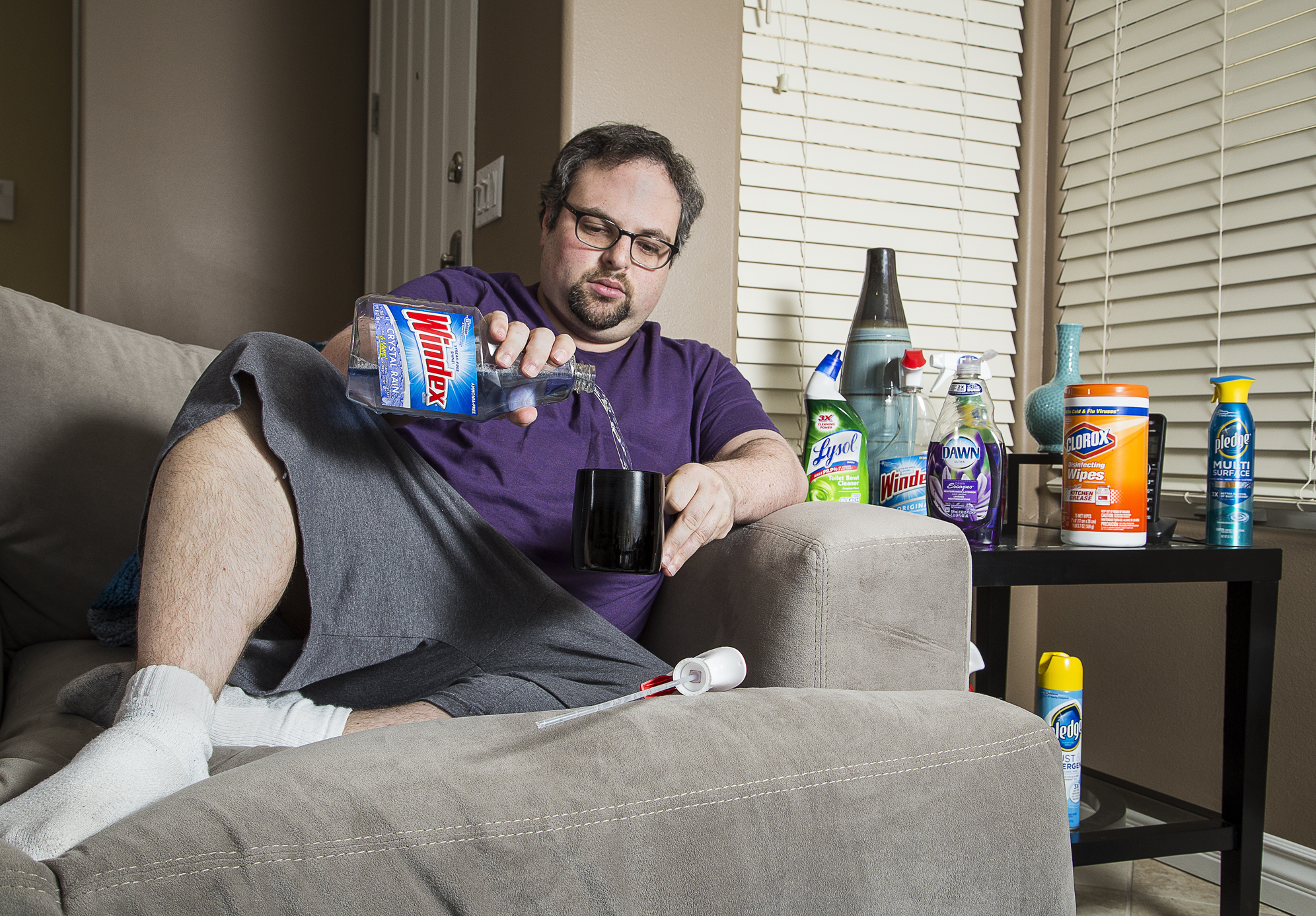 "Drink Me"/Dan Fenstermacher
"Drink Me"/Dan Fenstermacher
"As a kid, my OCD started out pretty traditional: physical rituals like tapping counting, checking. As I got older, however, it morphed to fear of illness. A headache was a brain tumor, a fever, meningitis. At my worst, I was literally afraid I would bash my own head in with my hands. I guess that falls under the category of “self-harm” but among many other OCD thoughts, I was afraid of my own hands and often laid in bed for many hours, literally laying on top of them to protect myself."
3. Nancy Wu
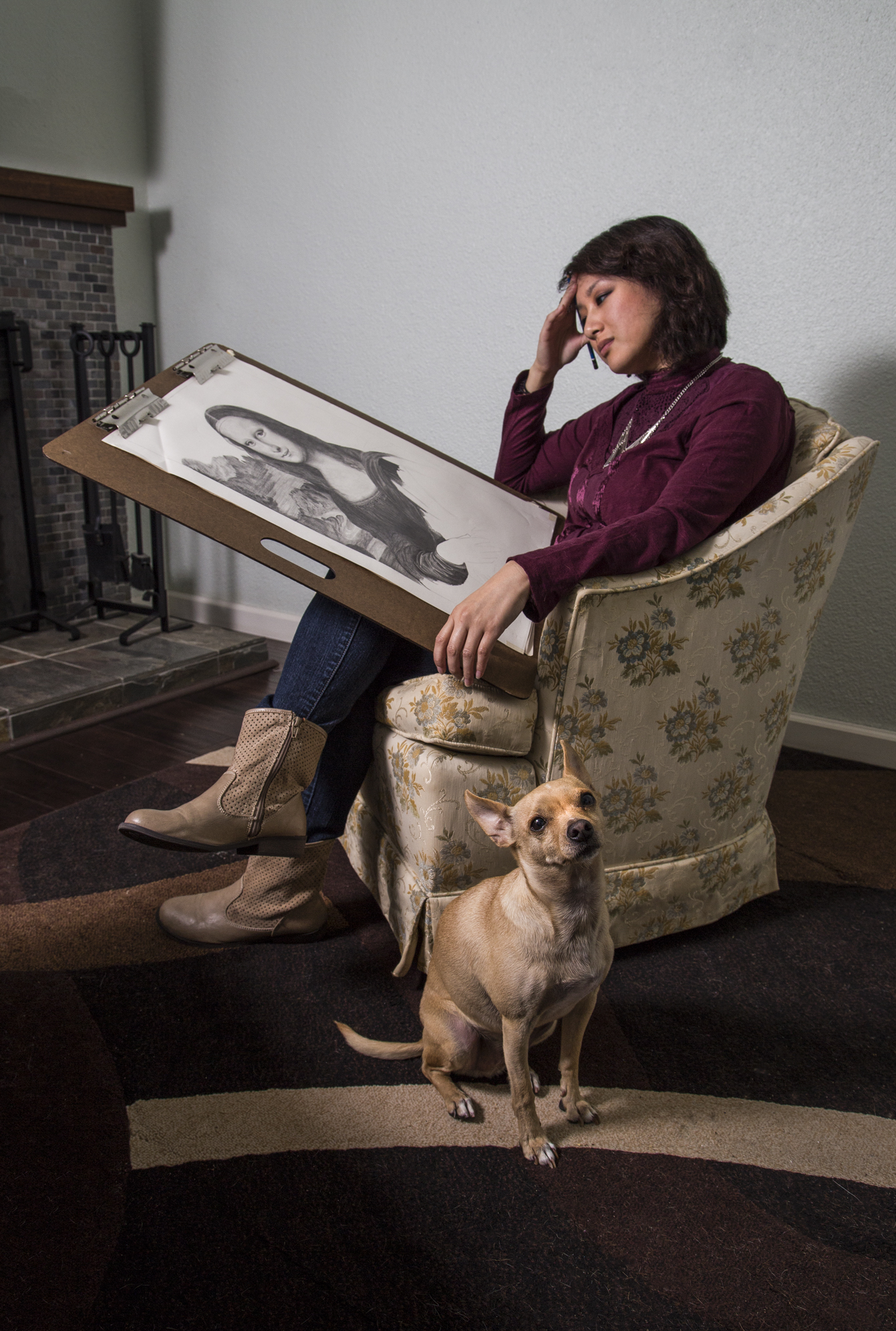 "Never Finished"/Dan Fenstermacher
"Never Finished"/Dan Fenstermacher
"I suffer with OCD in perfectionism, depression, and anxiety disorder. I struggle with completing projects because I’m afraid of making mistakes and I fear my work will be seen as being poorly done. My intense fear of making the wrong decision has made me an indecisive person. Everything I do needs to be “done right” or “perfect” to my standards, and I always set the bar too high for myself. When I get anxious, I pick on my skin and scabs. I also become fatigued and depressed. You are not alone! For the longest time, I thought I was a crazy, neurotic, lazy, unworthy, and useless person until I found out it’s a disorder and it’s possible to get help. I feel like I have wasted so much time going through life without knowing I have OCD and procrastinated on getting the help I need so I hope others can learn from my mistakes and take action to get on the path to healing as soon as possible."
4. Laura Lavadour
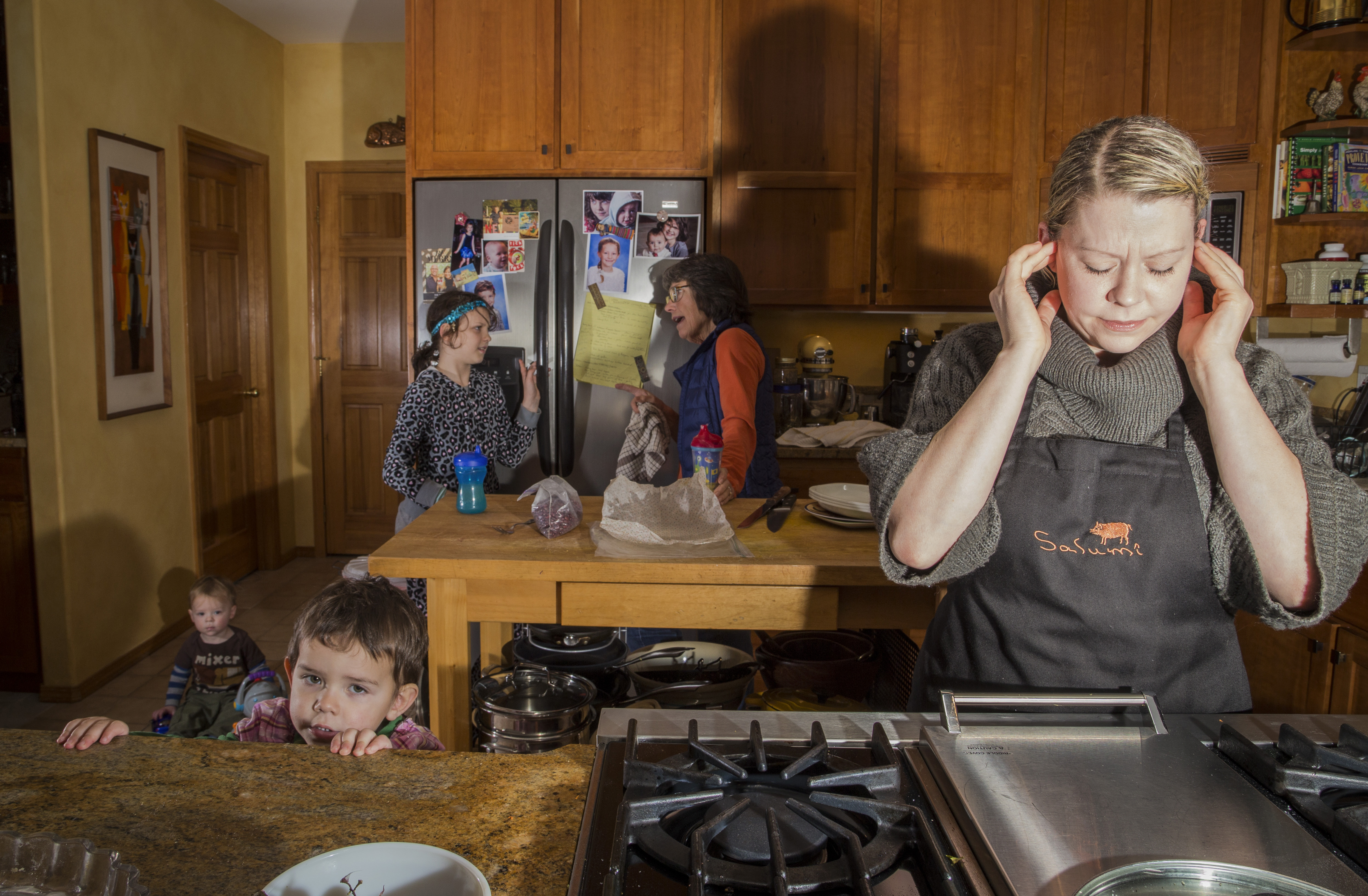 "Auditory Aversions"/Dan Fenstermacher
"Auditory Aversions"/Dan Fenstermacher
"One of the biggest symptoms of my OCD is a rare one called Misophonia: bothered by certain sounds or noises. This started very young and I’ve struggled with it all my life. The other types I have are intrusive thoughts, symmetry, and orderliness. I am currently on a combo of meds that is working for me. My symptoms are manageable. I am also exercising a lot which really helps. My advice to others is to reach out and talk about your issues with OCD. Sometimes you can get locked into a train of thought and feel trapped. Reaching out and listening to others experience can be uplifting, and can also open up opportunities to treatments that you might not have considered before."
5. Dan Fenstermacher
 "Under My Skin"/Dan Fenstermacher
"Under My Skin"/Dan Fenstermacher
"I have struggled with Obsessive Compulsive Disorder (OCD) since I was a young child. I was embarrassed by my compulsions and did not understand what OCD was until I was 23. For many years I hid my OCD from the outside world and those around me, living without getting help. Through reaching out to Jeff Bell, an OCD activist, author, and founder of the non-profit A2A, I was able to find relief and realized that through helping others with their OCD struggle, I could help myself. I read Jeff’s books and was inspired, and when I moved to the Bay Area for graduate school at San Jose State University, I contacted Jeff and met him near his office in San Francisco. Since then I have volunteered for A2A and began making many contacts in the OCD community here in the Bay Area. When I started to feel better I wanted to give back to others who struggle with OCD, adopting Jeff’s ‘Greater Good Motivation’ for helping others and finding purpose in life."
Fighting the stigma of mental illness and misinformation about OCD.
As ATTN: has previously reported, Obsessive Compulsive Disorder affects many people with diverse and varied experiences of the disorder. What many people may not realize is that OCD goes far beyond simply being a 'neat freak' and consists of two distinct symptoms: obsessions and compulsions.
Dr. Chris Pittenger, director of the Yale OCD Research Clinic, explained that obsessions are "intrusive thoughts that seem to come out of nowhere that cause anxiety and keep coming back again and again. Most people experience obsessive thoughts as being somehow different from their ordinary thoughts—more intrusive, more rigid, and they cause anxiety or discomfort."
Compulsions are what people do due to obsessive thoughts. "They're the behaviors that people do in order to try to alleviate the anxiety or discomfort,” Pittenger told ATTN:. “The compulsions work only incompletely or intermittently [to relieve the anxiety], so people tend to engage in them more and more to try to get the relief they’re seeking.”
OCD is believed to stem from hyperactive brain circuits that overwhelm the brain with information that is filtered out in a neurotypical brain.
“It’s a loop," Dr. Pittenger said. "And in people with OCD, certain parts of the cortex, especially subsets of the cortex in the front of the brain, which process more abstract ideas, are hyperactive, as are several structures within the basal ganglia.”
OCD is most commonly treated with SSRI antidepressants such as Zoloft, Celexa, and Lexapro, cognitive behavioral therapy (CBT), or a combination of the two. Of course, people find relief in many other ways, such as group therapy and mindfulness meditation.
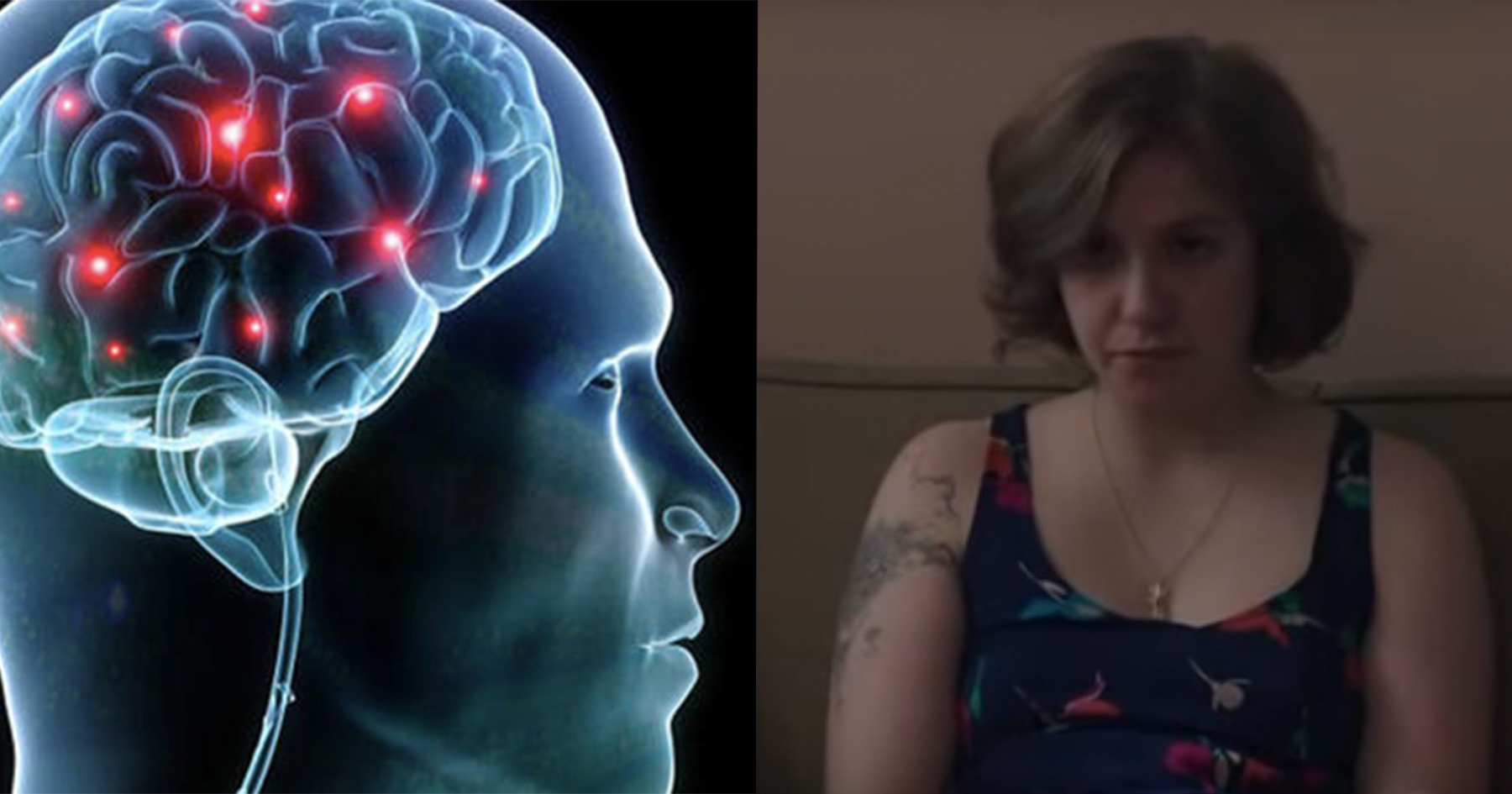 Flickr/ Allan Ajifo, HBO/ Girls - hbo.com
Flickr/ Allan Ajifo, HBO/ Girls - hbo.com
Unfortunately, OCD has also been the butt of many jokes, which takes away from the seriousness of the health issue, and mocks the individuals who suffer.
“Corporations such as Target make a joke out of it for profit, for example, their 'Obsessive Christmas Disorder' sweatshirts they sold this past holiday season. They would never make a joke that way about cancer or leukemia but OCD is seen as something that is 'weird' and therefore can be made into a joke. However, it is not a joke and is a serious condition that affects nearly 1 out of 100 people.”
Fenstermacher told ATTN: that he hopes to ultimately publish a photo book of the project to educate viewers, connect with others living with OCD, and inspire them to seek help.
“It is my intention with this project to demonstrate how life extends beyond oneself as it offers a narrative into the daily challenges people with OCD face, and often overcome,” he said. “My goal is to inspire those who suffer to seek out help with their OCD-related problems and find relief through therapy, as well as to combat negative stereotypes associated with OCD.”
